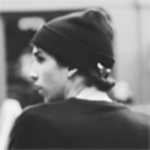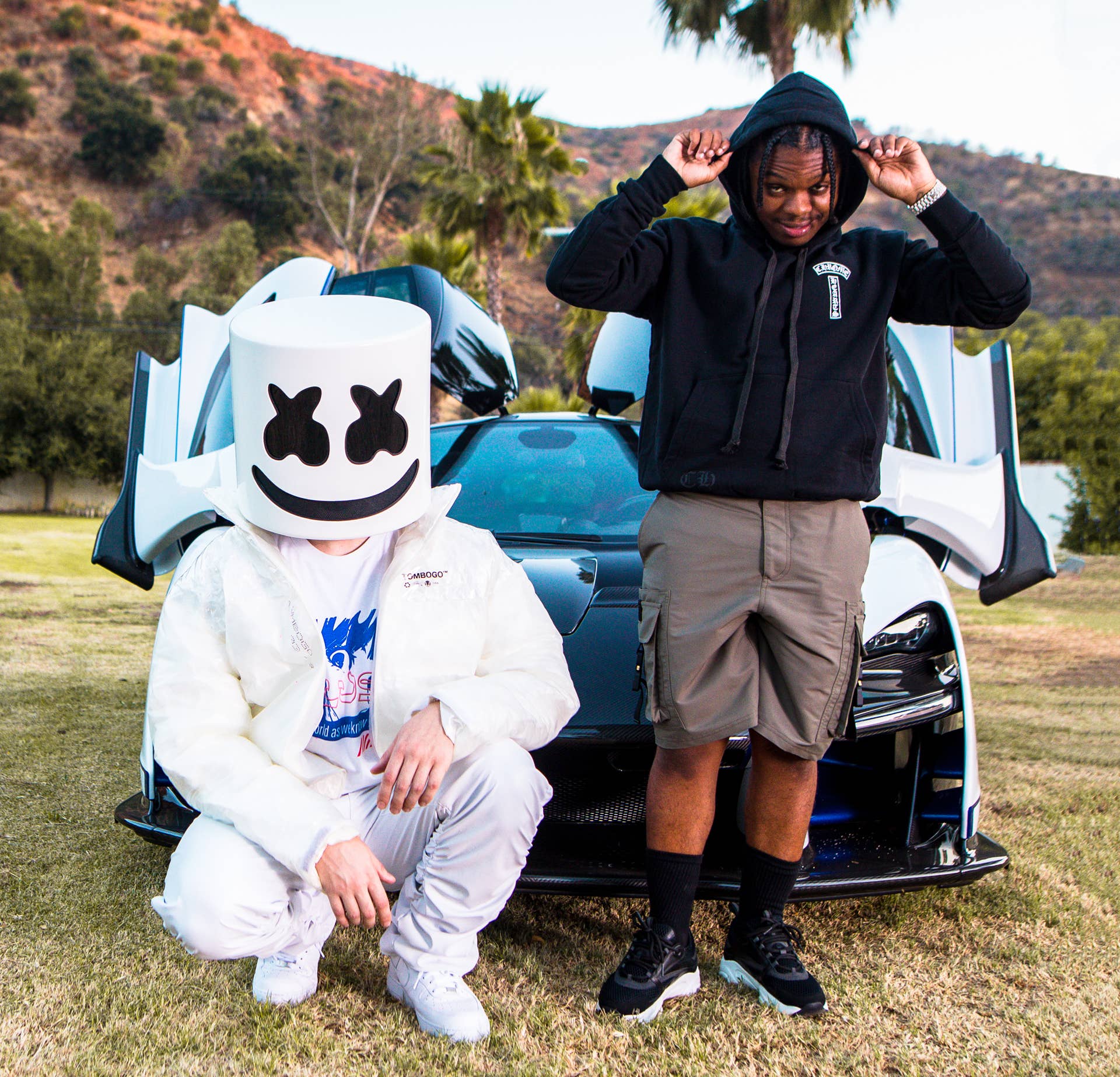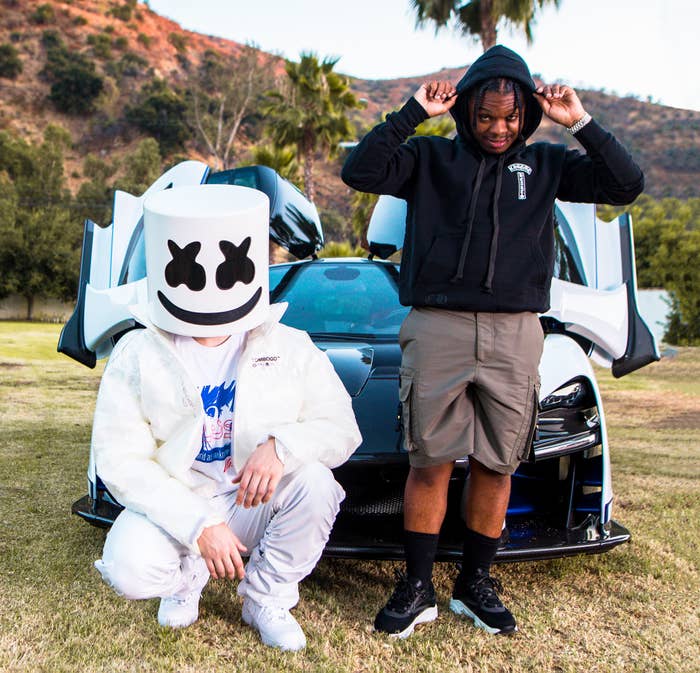
What’s the first thing that comes to mind when you think of Marshmello?
An oversized marshmello head? Massive headlining sets at electronic music festivals? Collaborations with pop stars like Halsey?
In a sense, that’s all true. Since emerging in 2015, Marshmello has become one of the most successful electronic producers and DJs on the planet, racking up billions of streams and earning tens of millions of dollars thanks to his dominance in EDM and pop music (in 2018, he covered Forbes after making $44 million in just two years).
But there’s another side of the mysterious 28-year-old that he’s started to reveal lately. Marshmello is a hell of a hip-hop producer, too. Making songs with everyone from Roddy Ricch to 42 Dugg to Juice WRLD to Migos, he’s been building a sizable collection of successful rap collaborations, changing people’s preconceived notions along the way.
Marshmello is self-aware enough to understand why some people were skeptical to see him work with hip-hop artists at first. “I came from electronic music and now I’m jumping into hip-hop, so there was obviously a ton of people like, ‘Marshmello? Really? What?’” he acknowledges. “In the beginning, there was definitely some resistance, but I just kept at it.”
Not one to talk much anyway, Marshmello hunkered down in the studio, often pulling all-nighters as he sharpened his skills as a hip-hop producer. “I’ve been in the studio with a lot of artists and a lot of producers and I’ve shown I can hang in the hip-hop production space,” he says. “It’s taken a little bit, but my intention was to show everybody I can really do this. Yeah, I make electronic music and that’s how I started. But I like to make a ton of other music and hip-hop is one of them.”
He points to a studio session with Meek Mill as a pivotal moment when it came to building his own confidence and earning the respect of hip-hop collaborators.
“I didn’t know what some artists would think of me trying to come and make hip-hop,” he notes. “But I remember I played a beat for Meek in the studio, and he was like, ‘You made this? This is fire,” like, tripping out. I said, “Yeah, man. I literally just made it before I left my house.” And that’s when I was like, OK, I think I can do this.”
Marshmello’s manager Moe Shalizi points to his work ethic in the studio as a key to earning the respect of other artists. “I think with Mello wearing a helmet all the time, people don’t really know or relate to the personality behind him,” Shalizi says. “But anybody who meets Mello in person, in the studio, is automatically just like, ‘Yo, he’s one of the coolest dudes.’ It’s not transactional for him. I remember we went to the studio with Southside and another artist one night, and Mello was in there until like 5 in the morning. This artist is a huge rapper, and he goes to Southside, like, ‘Yo, I can’t believe Mello was in the studio with us all night. Isn’t that guy worth like, 50 or 60 million?’
I remember I played a beat for Meek in the studio, and he was like, ‘You made this? This is fire,’ like, tripping out.” – Marshmello
“I think that’s the thing that people misconstrue sometimes,” Shalizi adds. “He really loves this. He’s really dedicated to this hip-hop shit.” He jokes, “I feel like I’ve got to make him stop doing hip-hop sometimes, because he’ll sit for two or three weeks in a studio, just cranking out beats. He loves it so much.”
Marshmello points out he’s been incorporating elements of hip-hop into his music since the beginning of his career, and he says he’s always been a big fan of the genre, but he hadn’t released any rap songs of his own until 2017 when he collaborated with Migos on “Danger” for the Bright soundtrack.
“I was touring a lot, so I worked from hotel desks with headphones and laptop speakers, trying to get this done,” he remembers. “I was a little wary because that was my first jump into hip-hop, and I was really tripping on like, oh, I have to incorporate EDM influences because I can’t just go straight into this. And then Moe was like, ‘Bro, just relax. Do whatever you think the song should sound like.’ So I made the beat, and the next thing I knew, I got a rough cut from Migos.”
Now, the song has over 140 million plays on Spotify and 70 million on YouTube. From there, Marshmello and Shalizi paid close attention to rising hip-hop artists who they could tap for future collaborations. One day in mid-2018, Mello came across a video of Roddy Ricch previewing his next single “Every Season” with ukulele player Einer Bankz and was immediately blown away. Within a week, they got in the studio together and made “Project Dreams,” a song that Marshmello credits as a turning point in his progression as a hip-hop producer.
“Project Dreams,” like all of his hip-hop collaborations, isn’t just an EDM song with a rapper thrown on top of it. The beat caters to the natural strengths of Roddy’s vocals, showing Marshmello’s ability to bring his hit-making expertise to rap in a seamless way. If it weren’t for the “Mello made it right” tag at the beginning of the song, you might not even pick up on the fact that it’s a Marshmello production at all. (The tag, which was recorded by Roddy in one take during that session, continues to be used on all of Marshmello’s songs and he says “it’s going to continue to be on every one of my songs.”)
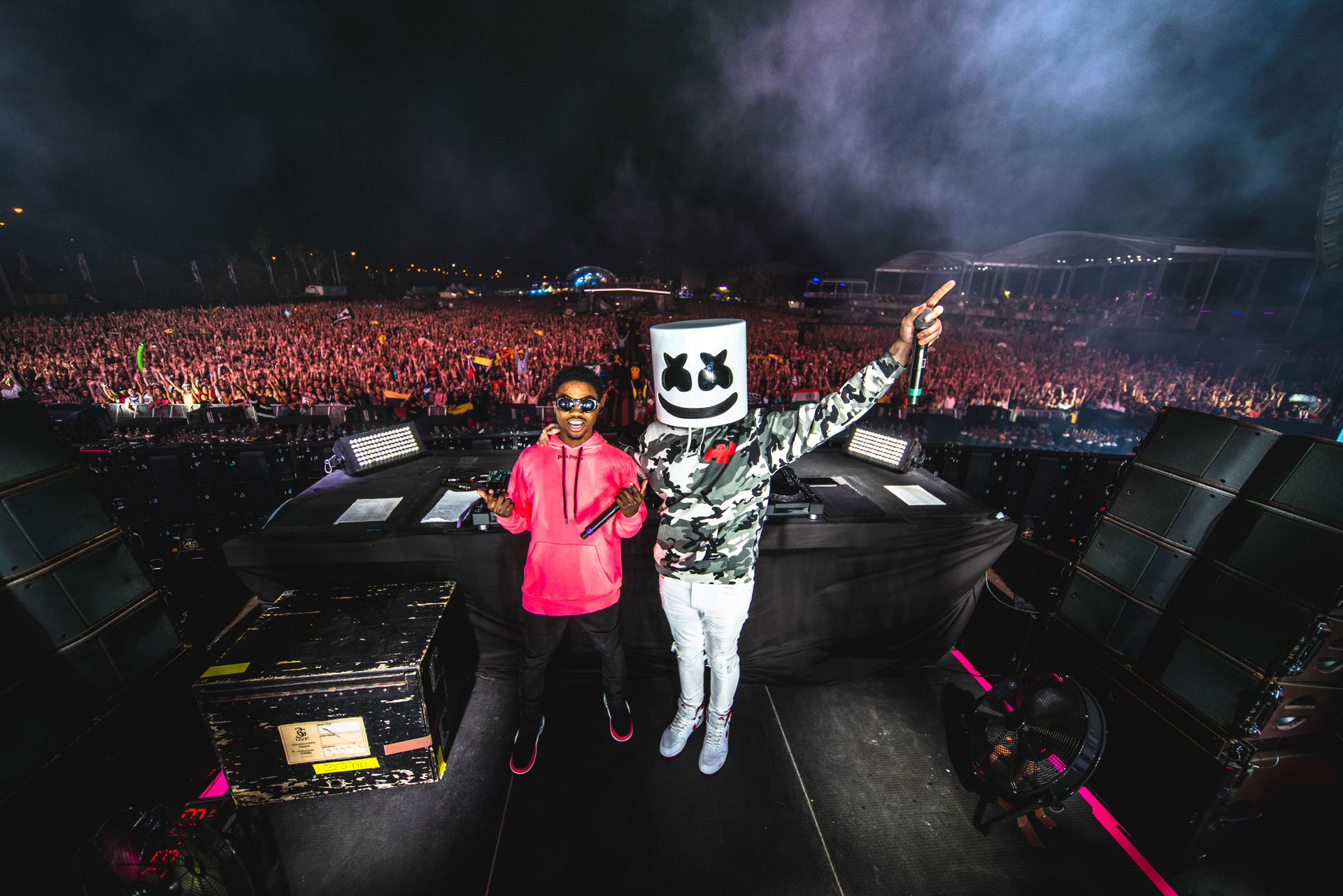
If you ask Marshmello about the song now, he keeps it humble and deflects the credit to Roddy. “I consider myself a pretty melodically inclined person, and one thing I always say about Roddy is that he would sing melodies that I didn’t see coming,” he remembers. “I would always think like, oh, he’s going to sing this, and then he sings something totally different. I’d be like, what? How do you even think of that? He’s just completely on another level, you know?”
During an interview with REAL 92.3 LA, Roddy gave respect right back to Marshmello, saying, “He’s lit. He’s got a great team and we all just vibed. It wasn’t forced or anything.”
“Project Dreams,” which now has over 200 million streams on Spotify alone, was an immediate success. In March 2019, Marshmello brought Roddy out to perform the song at Ultra Music Festival in front of one of the largest crowds the rapper had ever played for. “That’s my world, right? Playing these massive electronic music festival stages with like 60,000 kids in the crowd,” Marshmello says. “And Roddy came out and he was just, like, ‘What the fuck, bro?’ Like, ‘That’s hella people.’ That was a pretty cool moment.”
Experiences like this motivated Marshmello to use his platform to help rising artists reach new audiences. The most surprising thing about his foray into rap is that instead of just working with the biggest and most obvious rappers he can, he’s focused on finding exciting up-and-comers.
I just like good music, regardless if it’s the biggest artist in the world or somebody up-and-coming. As long as I can make something that’s great, that’s all I need.” – Marshmello
“As far as how I find the music, it’s honestly a mix of stumbling onto songs on Spotify, Twitter, and maybe even Reddit,” he says. “Also, Moe will be like, ‘Hey bro, check this kid out.’ I just like good music, regardless if it’s the biggest artist in the world or somebody up-and-coming. As long as I can make something that’s great, that’s all I need.”
Shalizi points out, “A lot of artists in his position would just work with the biggest people they can, who are already established. But I think Mello gets more enjoyment and fulfillment out of going and working with the next up.”
Marshmello’s ear for rising talent has a lot to do with his success so far. “I feel like, especially in the DJ space, there’s so much corny shit that happens,” Shalizisays. “Just off his catalog and his history, you can see that there’s a lot of time and effort that goes into the A&R process of who we work with and what we do. That’s all about being authentic to the artist. Like, if you saw the Chainsmokers come out with a song with 42 Dugg tomorrow, you’d be like, uhhhh? You know what I mean? I think that’s one of the most important things.”
Marshmello’s song with 42 Dugg was another instance of a perfectly timed collaboration with a rising star. Just as Dugg’s breakout song with Lil Baby, “We Paid,” was taking off, he got in the studio with Mello and they made “Baggin’,” a hard-hitting record that brings out the best of both collaborators.
“I already fucked with Dugg’s music, so I jumped at the chance to work with him,” Marshmello says. “I had a pack of samples sent to me from this kid, Ambezza. So I took it and chopped it up and I didn’t really know what was going to happen with the beat. But we got in the studio, I played that beat, and Dugg started saying all this stuff that’s on the song now. All this crazy stuff. I was like, ‘Oh, that’s it. Let’s cut it.’ And that was that.”
Back in 2017, in the early stages of working with hip-hop artists, Marshmello developed a relationship with Lil Peep. Before the rapper’s tragic death in November 2017, the two spoke about making music together, and their collaboration “Spotlight” became one of the first posthumous releases from Peep.
“While Lil Peep was alive, I was listening to him a lot, reached out to him, and sent him a beat,” Marshmello says. “He was on tour, and I was texting him, talking to his tour manager and some of the people on his team. Unfortunately, he passed away, and I got a call about two weeks later from his mom. She was like, ‘Hey, Gus was so excited to work with you. We’d really love to send you this album, and if you like any of the songs, just maybe tell us a song and see what you can do with it.’ I heard ‘Spotlight’ and I flipped the production into my own. You know, when an artist’s mom calls you, you want to do it right. I had already wanted to work with Lil Peep, but then it became bigger than just sitting down and making a song.”
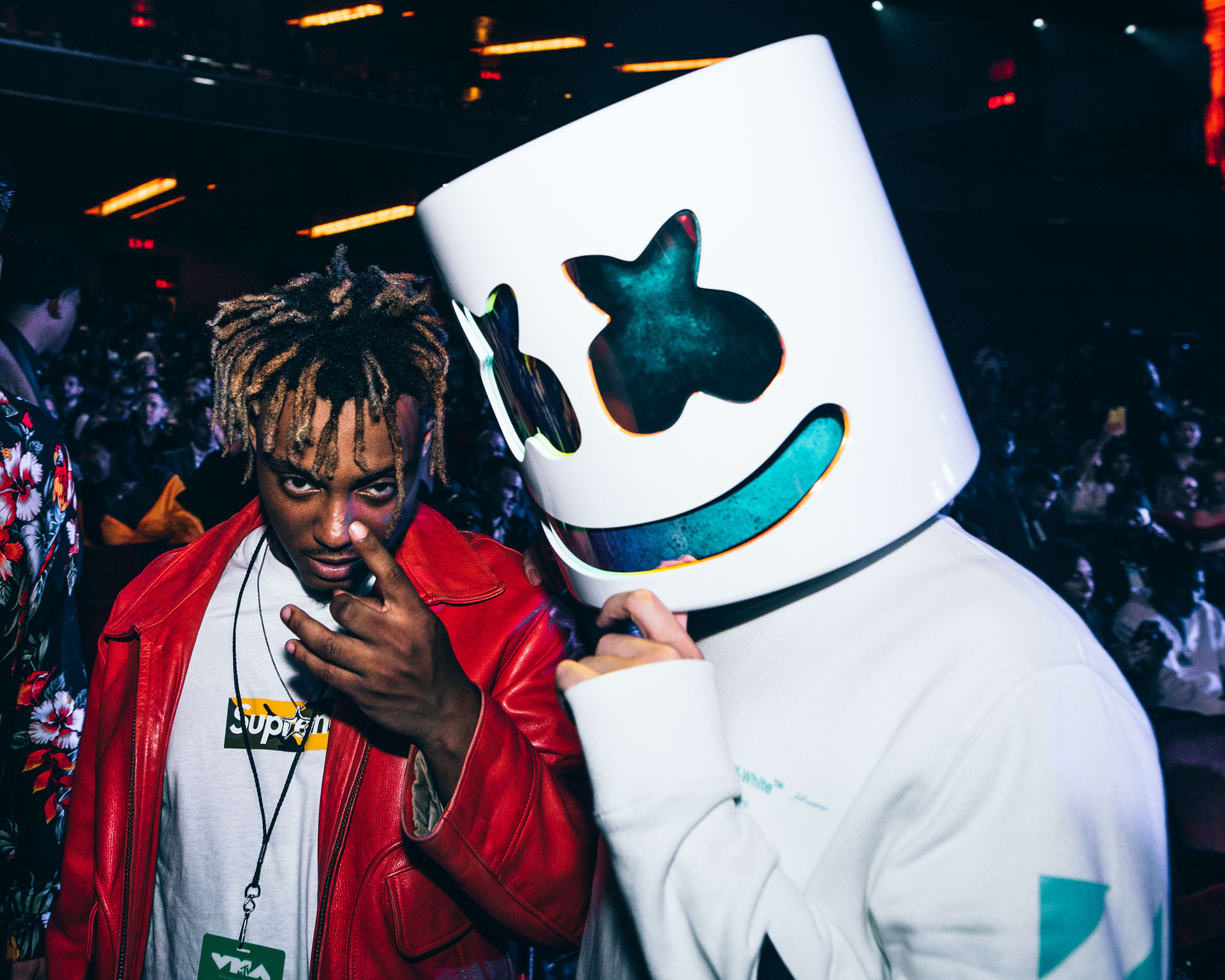
One of the highest-charting songs of Marshmello’s career, “Come & Go,” arrived on another posthumous album, Juice WRLD’s Legends Never Die, which also featured their collaboration “Hate the Other Side” with Polo G and the Kid Laroi.
Speaking fondly of his time in the studio with Juice, Marshmello says he was particularly happy with the way “Hate the Other Side” was created. “It was me, Juice, and Polo. Juice had this house in California, and we turned the movie theater into a studio,” he remembers. “Me and Juice had already hung out a bunch and made a bunch of music. And that day, they were playing video games on this massive screen in the theater, and we cut that song, all at once. Just bang, bang, bang. Everybody did their verses and it was done. We were all just feeling it. It was so satisfying. Then there was a second open verse, so Laroi got on later and he just absolutely smashed it, too.”
“Shoutout to Juice WRLD,” Marshmello adds. “He was just the most versatile, talented artist I’ve ever met in my whole life. To be able to have him and his team and everyone involved to trust a lot of the music that we made, and actually be able to put it out, it’s just a big blessing and something I’m really proud of.”
Praising Juice’s diverse skill set as a rapper, he says, “He’s like an X-Men. If there was a school to send people to be X-Men artists—like, just not from this world—that’s Juice. And he was always having fun. I remember he freestyled over a ton of Eminem instrumentals for like an hour, and then we were like, ‘Hey bro, should we make music? Or you want to keep freestyling? [Laughs]. But no, man, moments in the studio with Juice are times I’ll never forget for the rest of my life.”
“Juice WRLD was just the most versatile, talented artist I’ve ever met in my whole life.”
Reflecting on their wildly productive working relationship, Marshmello reveals, “We did about four songs a night, and we had gotten together probably 10 times. There’s definitely a lot of music. Juice was one of those artists who makes a ton of music, you know?”
One common thread that ties Marshmello’s collaborative hip-hop songs together is that almost all of them have been created in person. “I just love the atmosphere,” he says. “I like building a relationship with people and just showing them I’m really about this.”
Shalizi points out that the in-studio collaborations allow Marshmello to be much more effective than he would be over email. “Mello has a big part in the melodies and the structure of the songs, too,” he says. “His influence is crazy for artists. You watch Mello and Southside in the studio together, especially with someone like Morray, who is one of our new artists on our label, and you can see how many ideas are sparked. You can put him in the studio with everybody and he can figure out how to make something happen. He gets both sides of hip-hop and pop, but then he can also go make a country song. It’s pretty unique just how talented he is as a producer.”
Most recently, Marshmello has been getting in the studio with up-and-comers like Wacotron, Morray, and 2KBABY. When he heard an early version of 2KBABY’s “Like This,” he was blown away by the young rapper’s vocals. He called 2KBABY and told him, “You know you’re going to be like a rockstar, right? Some pop writers wish they could write like this.” Excited by what he heard, he got to work remaking an old beat. “I was actually living at Moe’s house at the time,” he says. “And my studio was set up on a beer pong table. Like, we actually used the beer pong table like the week before. So I stripped the beat, sat down, brought out my guitar, and tried to make something catchy.”
Moments like these are what keep Marshmello coming back to hip-hop production and staying up all night in the studio. Explaining why he’s been having so much fun making beats lately, he says, “I can go and sit all day on my guitar and make this super melodic song with all these different parts. But then once I put the hip-hop drums in, it becomes this whole new thing. If you were to hear it without the hip-hop drums, you would be like, ‘Oh man, this would be a great pop song.’ But when you add those hard 808s, it transforms. That’s the excitement, making a sample and flipping it to work with 808s. There’s just so much to do within the space, and that’s what excites me. I’m addicted to it.”
Marshmello has been logging substantial hours in the studio with A-list hip-hop producers, too. “I work with Tay Keith a lot, and I work with Jetson[Made] and Southside,” he notes. “None of the beats that I’ve made with them have come out yet, but it’s just a matter of getting that right song with that right artist, and putting it out.”
“I’m creating a collective of producers that I believe are creative and dope, that will soon make an impact in the music industry.”
He says these relationships serve as a driving force behind his growth as a producer over the past couple years, explaining, “Southside is like my big brother, so I’m always around him. Every time he comes in, he’s doing something new. I learn a lot just from being with people in the studio. Everybody has their different programs they use, and different ways of doing things, which pushes me to try new things. It’s friendly competition. I love it.”
Now, Marshmello wants to pay it forward and set up another generation of producers for success. “I’m creating a collective of producers that I believe are creative and dope, that will soon make an impact in the music industry,” he reveals.
Polar Culture is a collective of producers hand-selected and backed by Marshmello himself. Announced for the first time this week, the collective currently consists of Munk, Danny Couture, Lil Mexico Beatz, Flexyboy, and Lil Dusty G. You can learn more about the collective and keep up with their releases on the newly launched Polar Culture website.
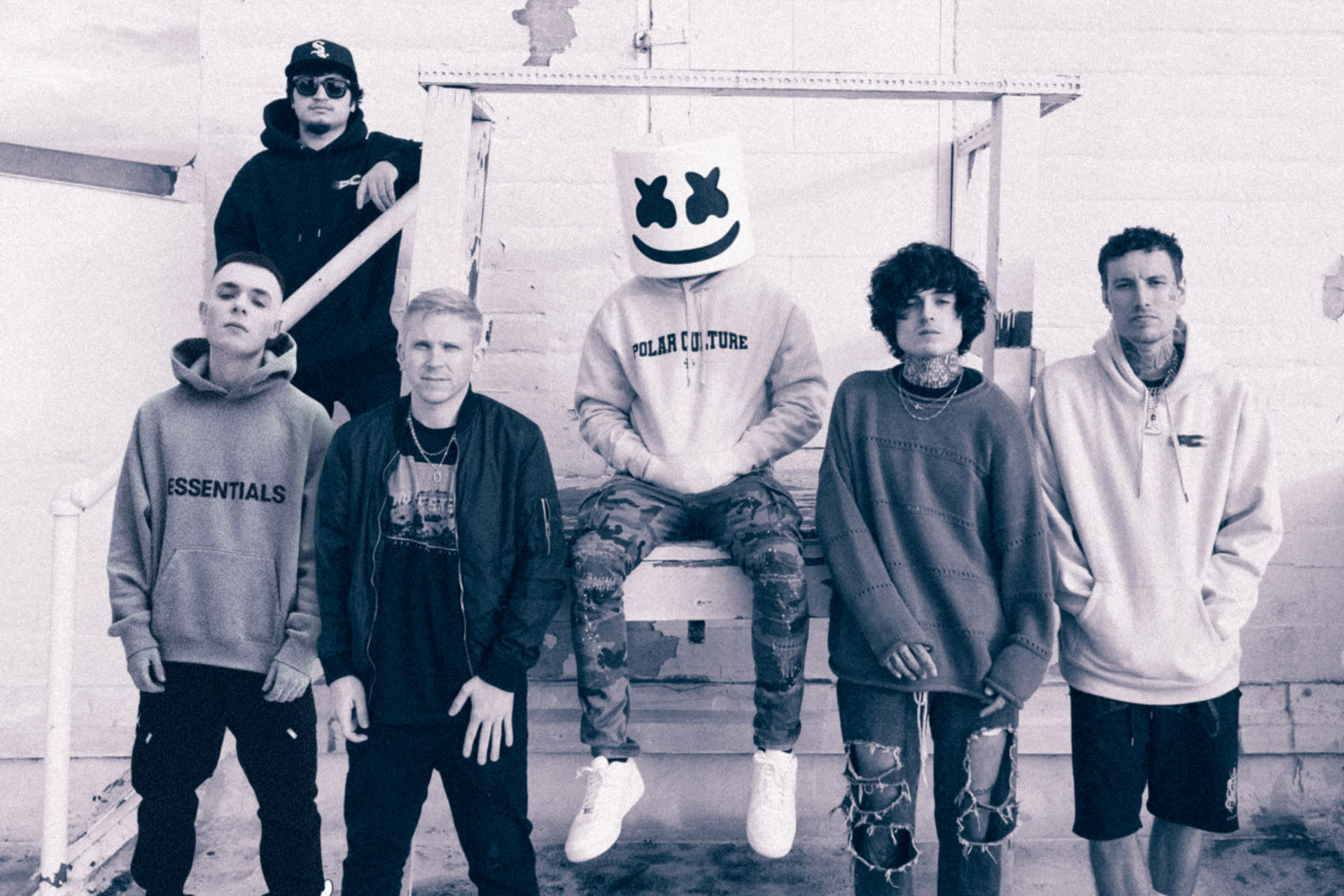
As far as his own career is concerned, Marshmello says he would love to produce a full album with a rapper someday, and there have been talks about releasing a hip-hop-focused project of his own at some point, but he wants to make sure it’s presented in the right way and doesn’t seem forced. At the moment, though, he says he’s just focused on making great records and changing people’s perceptions.
“In the hip-hop world, I think the biggest misconception is that he isn’t a real producer,” Shalizi points out. “Like, people assume that he’s a DJ and they don’t know he’s actually a producer. Then when they find out, like, oh, he produced that record, that record, that record, they go, ‘Oh fuck, that’s crazy.’”
Even Marshmello can admit he gets satisfaction from moments like this. He’s changing minds one hit at a time.
“It still just makes me happy to prove to anybody that I’m really about it,” he says. “Like, if they had a misconception about me, and I went out and made a song right in front of them… I like to go home and think, ‘Oh, I bet they didn’t think that would happen.’”
